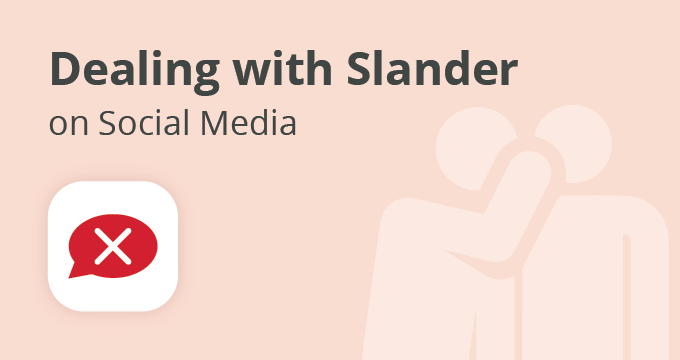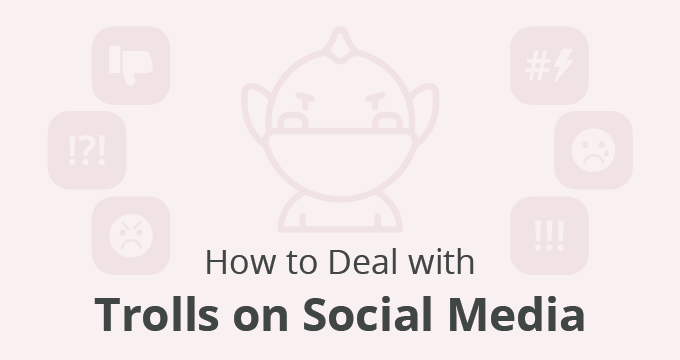Thanks to the rise of social media, it’s easier than ever for everyone, including high-profile individuals, brands, and corporations, to get their message out across the world.
However, there is another much darker side of social media platforms — the one characterized by trolling, cyberbullying, libel, and defamation on social media.
In this article, you will learn:
- What is defamation
- The difference between defamation, libel, and slander
- What is defamation on social media
- Best practices for avoiding and dealing with social media defamation, slander, and libel.
What Is Defamation?
Defamation is a legal term encompassing both spoken and written false statements that can harm an individual’s or corporation’s reputation.
The claimant must base a defamation claim on three elements:
- The statement must be false.
- It must be communicated to a third party, not a claimant.
- The statement can potentially harm the claimant’s reputation.
Being tied to specific laws, defamation can differ from country to country.
For instance, in some countries, the claimant can hold a third party responsible for defamatory statements no matter what steps they took before publishing it, while in the US, they must prove that the defendant was at fault.
This requires the claimant to demonstrate that the third party neglected their duty in conveying the defamatory statement. For private figures, this involves showing that the defendant acted negligently.
If the claimant is a public figure or official, they have to prove the case with malicious intent — that the defendant was aware that the “statement was false or recklessly disregarded,” whether it was faulty or not
In other words, public figures or officials must meet a higher threshold known as “actual malice.” This legal standard requires the claimant to demonstrate that the defendant either knew the statement was false or acted with reckless disregard for the truth.
This distinction is crucial and underscores the greater legal protections for free speech when public discourse is involved.
In this article, we will use the words slander and libel often, so it’s very important to know the difference.
The Difference Between Slander and Libel
Defamation is a broad term covering two categories, distinguished by how the harmful statement is communicated.
- Slander refers to false spoken statements or oral communication that can damage someone’s reputation and usually involves verbally made statements to a third party through spoken words or gestures.
- Libel refers to written or otherwise fixed false statements that can harm someone’s reputation. This can include written words, images, or any form of communication that leaves a permanent record.
Understanding these distinctions is crucial when dealing with defamation issues, as legal considerations and consequences can vary depending on the medium used.
What Is Defamation on Social Media?
Defamation on social media is the act of making false statements about an individual, business, product, or service through social media channels.
As such, defamatory content on social media can take the form of text, images, videos, or any other medium that can be seen by the wider public.
The ease with which content can be shared on social media platforms, coupled with perceived anonymity, has contributed to a rise in online defamation cases.
Several high-profile lawsuits have demonstrated the legal weight of defamatory statements made online:
- Alex Jones and Sandy Hook Families — In one of the largest defamation verdicts in U.S. history, conspiracy theorist Alex Jones was ordered to pay nearly $1.5 billion to families of Sandy Hook victims for spreading false claims that the school shooting was a hoax. The case highlighted the devastating impact of viral misinformation.
- Johnny Depp vs. Amber Heard — Although primarily centered on domestic abuse allegations, the 2022 defamation trial between actors Johnny Depp and Amber Heard drew international attention. Depp sued Heard over a Washington Post op-ed, and the jury awarded him $10.35 million in damages, finding that the article defamed him. Heard was also awarded $2 million in a counterclaim.
Some other famous examples of social media defamation cases include Elon Musk, Donald Trump, Courtney Love, and James Woods. They have all been involved with numerous libel lawsuits over tweets, with mixed results.
To be considered a defamation case, social media content needs to possess three elements:
- Falsity. The posted content and its statements must be false.
- Harm. The content must harm the reputation of the subject.
- Publication. The content needs to be shared (posted) to a wide audience.
Examples of social media defamation
Almost all content shared publicly can be considered defamation if it impacts someone’s reputation, and the most common examples are:
- YouTube video spreading lies about a prominent figure,
- Creating fake news stories on Reddit,
- Posting edited images on Instagram,
- Listing fake reviews on a Facebook business page,
- Leaking fake information on Twitter,
- LinkedIn posts suggesting unethical practices of a competitor,
- Accusing someone in the comment section.
As you can see, social media defamation usually comes in the form of false information, exaggerating the truth, taking things out of context, and sometimes blatantly lying.
Do note that defamation on social media isn’t always purposefully done to harm someone’s reputation. Sometimes, the person posting isn’t even aware that they are committing defamation.
But what do you do when someone slanders you on social media?
Can You Sue Someone for Slander on Social Media?
Yes, you can sue an individual for slander or libel on social media, but proving defamation can be difficult and requires substantial evidence. While high-profile figures often have legal teams to manage such cases, private individuals can also take action if they document the defamatory content properly and demonstrate reputational harm.
However, suing the social media platforms themselves, such as Facebook, X (previously Twitter), Instagram, or YouTube, is typically not an option.
These platforms are granted immunity under internet legislation known as Section 230 of the Communications Decency Act, a U.S. law that grants online service providers immunity from liability for content posted by their users. In most cases, platforms can’t be held legally responsible for defamatory posts unless they are directly involved in creating or significantly altering the content.
Because of this, legal action should be directed at the individual who made the defamatory statement, not the platform hosting it. If you’re considering a lawsuit, consult a lawyer to evaluate your case and understand your legal options.
How to Deal With Slander on Social Media
If you are confident you’ve been subjected to libel or slander on social media, there are a few steps you can take to try to fix the situation.
The following tactics are a must:
Don’t react
It might be counterintuitive, but overreacting to the slander can generate an even more bad reputation for you.
You are risking going into a war against the other side, which usually spreads over social media, where the other side usually has the advantage since they slandered you.
The exception could be if you have 100% solid evidence and you can clean yourself off from slander in a calm way.
But it’s important to consider the actual harm the statement may pose to your reputation and think about your next steps thoroughly. However, regardless of your next steps, ensure you’ve captured the published statement before the author deletes it.
Gather proof
When defamation happens, the author can always edit or delete the post, comment, photo, or article in question, leaving you without the original evidence of the defamatory statement.
So, to prevent this from happening, your first action when defamatory content is posted is to capture it quickly, as you will be able to use it in a lawsuit.
However, bear in mind that social media content is unstructured data, which makes it challenging to process and organize effectively. This is where social media data archiving solutions become invaluable. They preserve the content in a WORM format so that you can easily identify the record you need, retrieve it, and use it in full evidentiary quality.
It is advisable to use a tool to keep a defensible and authenticated copy that you can also use in court if the matter goes that far.
A social media archiving solution can help with that, especially if you’re an organization that uses social media to communicate with citizens, customers, or the general public.
Consult a lawyer
Hiring a lawyer will help you understand if you’re dealing with a genuine social defamation case or a lost cause.
They will also be able to provide expert advice, guide you in the right direction, and help you decide what your next steps would be.
The sooner you consult a lawyer, the better — it will prevent impulsive decisions or taking actions that could potentially harm your cause.
Send a cease and desist letter for defamation
One of the steps a lawyer might recommend when dealing with slander on social media is sending a cease and desist letter.
A cease and desist letter on social media is a document that formally requests the author to stop engaging in defamatory or harmful behavior.
They can, of course, decide to ignore your request, in which case, you would have to take the matter to court.
Still, a well-written letter from a reputable law firm is often enough to get a defamatory statement deleted or retracted. Even if some damage has already been done, a cease and desist letter can prevent further negative consequences.
Make your statement
While it’s far from advisable to engage in a Twitter or Facebook battle, issuing a statement to renounce a social media defamation claim may be wise.
However, before creating and publishing such a statement, it’s advisable to enlist help from a communications expert or a PR firm.
Your response to the social media defamation needs to be factual, balanced, and without any defamation from your side.
This statement needs to be shared through proper channels and should address the situation correctly without talking about taking legal action.
Such communication will clearly demonstrate that the claim is false and that you don’t want to get into further arguments.
Take the case to court
If all the previous measures don’t achieve the desired results and you see that the defamation has a significant impact on your reputation, then it’s completely in your right to take the case to court.
You need to prepare your evidence because you’ll need to prove they weren’t edited and that the posts were 100% false, as well as how they impacted you.
However, keep in mind that social media slander cases depend heavily on the particular jurisdiction and the quality of the proof.
Consider jurisdictional differences
Keep in mind that defamation laws vary significantly between jurisdictions.
What qualifies as defamation in one country or U.S. state may not meet the legal threshold in another. For example, U.S. laws offer broader speech protections, requiring public figures to prove “actual malice,” while countries like the UK tend to be more claimant-friendly, placing a heavier burden on the defendant to prove the truth of their statement.
Before taking legal action, it’s important to consult a legal expert familiar with the defamation laws in your jurisdiction.
This ensures your case meets the local legal criteria and helps you avoid investing time and resources into a claim that may not hold up in court due to regional legal standards.
Conclusion
Defamation on social media is a very serious topic and occurs more often than you think. That’s why you need to be prepared and take proper action.
Archive the defamatory content as soon as possible and immediately contact a reputable lawyer for the best chances of winning the potential case. However, it’s always in your interest to stop the case from going to court.
It’s crucial to know that defamation can even happen from inside your own organization, by your employees, through their posts, comments, and messages.
This is why archiving your organization’s social media data is crucial. It creates an exhaustive record, ensuring nothing escapes your notice and providing you with solid evidence to address any concerns or disputes.
Summary of the Main Points
- Social media defamation is a growing issue, impacting both individuals and organizations.
- Defamation is a legal term referring to both spoken (slander) and written (libel) false statements that can harm an individual’s or organization’s reputation.
- Defamation on social media occurs when someone posts or shares false statements about an individual or organization online, harming their reputation. This can happen through various content formats on platforms like Facebook, Twitter, or Instagram.
- Preventive strategies such as implementing social media policies, educating employees, and using monitoring tools can help you avoid defamation on social media.
- To preserve evidence, you can later use in court, if necessary, quickly capture and archive defamatory content.
- Seek legal advice to understand your rights and the viability of your case before taking any steps.
- Consider sending a cease and desist letter or issuing a factual, balanced public statement.
- If everything else fails, it will be necessary to escalate the issue to court. That’s why having all the harmful statements and content that document social media defamation properly archived and easily retrievable makes all the difference.
Archive your social media content with Jatheon’s cloud archiving solution. Capture data automatically, easily find posts, comments, and chats, and manage your social media data with ease. Contact us at sales@jatheon.com or book a demo to see how Jatheon can help.
FAQ
How to avoid defamation on social media?
Maintaining a positive online presence and avoiding unnecessary controversy are essential steps in mitigating the risk of defamation. Regularly monitor your social media for negative posts, as these could potentially escalate into defamatory claims. To avoid inadvertently defaming others, prioritize factual accuracy, verify information before sharing, and refrain from posting controversial content or engaging in personal attacks.
Is a text message libel or slander?
Text messages usually fall under libel since they’re written, while slander is spoken. But here’s the tricky part: legal definitions can differ depending on your location. In some places, private texts might be seen as slander, but if they become public, they definitely count as libel.
Is suing for social media defamation worth it?
This depends on the severity of the harm suffered, the strength of available evidence, and the resources required for litigation. In many cases, suing may not be the most practical course of action, as it can be costly and time-consuming and may even exacerbate reputational damage. However, if the defamation is severe and a strong case can be made, legal action may be warranted.
What evidence do you need to prove defamation?
To prove defamation, you will need evidence that a false statement was presented as fact, posted on a social media platform, and caused harm to your reputation. Depending on the jurisdiction, you might need to prove that the person making the post acted intentionally. You should also provide specific details about the damage resulting from the defamation to make your case more compelling. Since every case is different and defamation is a tricky topic, consulting with a good lawyer is always the best course of action.
Can I be held liable for sharing retweeting defamatory content posted by someone else?
Yes, sharing or retweeting defamatory content can potentially expose you to liability. Even if you aren’t the original author, disseminating defamatory statements contributes to their spread and may be considered a republication. Laws vary by jurisdiction, but it’s best to avoid sharing content that could harm someone’s reputation without verifying its accuracy.
Which steps should I take if I receive a cease and desist letter alleging defamation?
Receiving a cease and desist letter is a serious matter. It’s advisable to consult with a legal professional to assess the claims made against you. Do not ignore the letter, as failing to respond appropriately can escalate the situation. A lawyer can help you understand your rights, evaluate the validity of the claims, and determine the best course of action.
Can defamation on private or closed social media groups still be actionable?
Yes. Even if defamatory statements are made in a private group or limited forum, they can still be considered “published” if seen by third parties. Courts may treat them as actionable depending on the size of the audience and the potential harm caused.
Can deleting a defamatory post protect the poster from liability?
No. Deleting a defamatory post may reduce the spread of harm, but it does not erase liability. If the content was published and caused reputational damage, the author can still be held accountable, even if the post is later removed. Archiving early evidence remains crucial.
Read Next:How to Deal with Social Media Trolls The First Amendment and Social Media Policies Social Media Ediscovery and Investigating Employee Misconduct |











